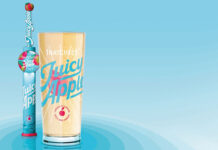Operators advised to give soft drinks range same attention as alcohol

THERE is a glut of reasons why more and more consumers are seeking out premium soft drinks in pubs and bars.
There’s the reduced drink drive limit, the wider premiumisation trend that has affected many categories in the on-trade and the move by some consumers to reduce their alcohol intake.
And whether it is a straight serve or used as a mixer for spirits, licensees that deliver a strong range of premium soft drinks can see profits from the lucrative sub-category fizz.
Adrian Troy, marketing director at Barr Soft Drinks, said: “When consumers visit an outlet to drink or to dine, they are willing to pay more for a premium offering, so a good choice of interesting flavours is essential.
“This is where premium soft drinks really come into their own, particularly amongst those who are looking for a non-alcoholic alternative to accompany a meal.
“Offering a range of still and sparkling options with both unique and traditional flavours will make a real impact, whilst craft drinks offer something different again, with provenance boosting their appeal.”
Amy Burgess, trade communications manager at Coca-Cola European Partners (CCEP), said a well thought-out approach towards soft drinks is essential.
“Forward-thinking pubs are tapping into the role soft drinks play throughout a whole day and for different consumers,” said Burgess.
“What a consumer wants to drink on a Saturday night is very different to someone visiting an outlet at 11.30am on a weekday to catch up on e-mails.
“As such, ensuring a quality experience for soft drinks as well as alcohol is critical so that they don’t miss out in what is an extremely competitive landscape for daytime, out-of-home moments.”
Consumers will pay more for premium, so a good choice of interesting flavours is essential.
Few trends have been as broad or as significant across the on-trade over the past few years as premiumisation, said Jen Draper, head of marketing for soft drinks firm Franklin & Sons.
“Premiumisation has undeniably become the trend of the last 18 months,” she said, “with more drinkers than ever before willing to pay more for premium drinks.
“Therefore those who choose not to stock premium serves of alcohol-free drinks are missing out on a huge opportunity.”
In order to fully exploit the growing thirst for premium soft drinks in bars, the same care must be taken with soft drinks ranges as alcoholic ones, said Gareth Hess, head of sales at Luscombe Drinks, whose organic drinks include Devon Apple Juice and Strawberry Crush.
He said: “Venues should make the same effort with soft drink offerings as they do with alcoholic drinks.
“We’d suggest a few core flavours are joined by ‘guest’ soft drinks of sophisticated and interesting flavours, that change regularly.
“This helps to keep the soft drinks list fresh and appealing.
“It’s also important to stock a range that will increase the outlet’s offering.”
A serious attitude towards soft drinks was also flagged by Red Bull’s on-premise marketing manager, Sophia Blawat, who said the “quality of serve” drives consumer choice.
“Getting this right can have a significant impact on sales,” she said.
“Quality is key to repeat custom and increased profits.”
Quoting Red Bull’s own research, Blawat said: “45% of consumers claim the quality of the drink is the most important factor when making a decision on a night out.
Those who don’t stock premium serves of alcohol-free drinks are missing out.
“And those rating their drink as ‘very good’ were over two times more likely to revisit a venue.”
The diversity of flavours that premium soft drinks now offer can also be incorporated into interesting mocktail serves, for those looking to consume less alcohol, said Burgess of CCEP.
“People are generally looking to reduce their alcohol intake, with over three million adults ordering smaller servings as a way to drink less alcohol,” she said.
“This trend is particularly key for millennials, as nearly a quarter of under 24s are not drinking alcohol.
“Mocktails can be just as creative as cocktails, and licensees should make the most of flavours from adult soft drinks… to keep their offer fresh and exciting.”
























